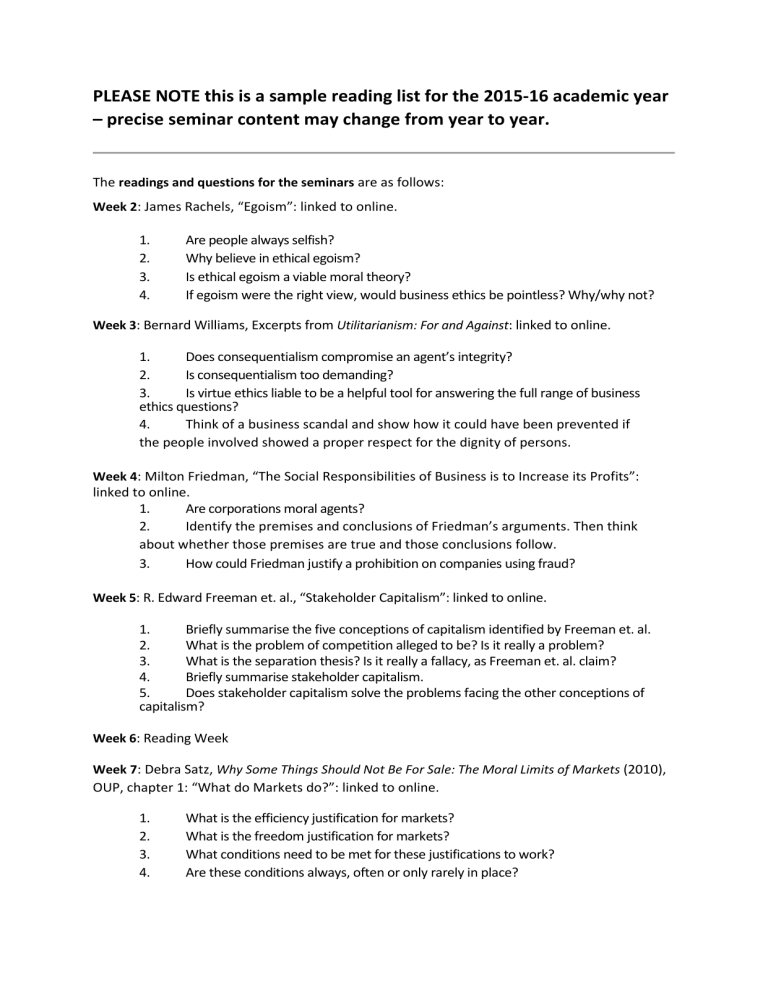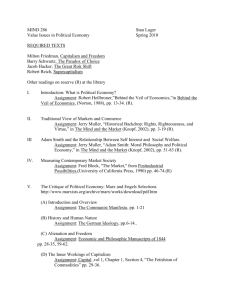PLEASE NOTE this is a sample reading list for the... – precise seminar content may change from year to year.

PLEASE NOTE this is a sample reading list for the 2015-16 academic year
– precise seminar content may change from year to year.
The readings and questions for the seminars are as follows:
Week 2 : James Rachels, “Egoism”: linked to online.
1.
2.
3.
4.
Are people always selfish?
Why believe in ethical egoism?
Is ethical egoism a viable moral theory?
If egoism were the right view, would business ethics be pointless? Why/why not?
Week 3 : Bernard Williams, Excerpts from Utilitarianism: For and Against : linked to online.
1.
2.
Does consequentialism compromise an agent’s integrity?
Is consequentialism too demanding?
3.
Is virtue ethics liable to be a helpful tool for answering the full range of business ethics questions?
4.
Think of a business scandal and show how it could have been prevented if the people involved showed a proper respect for the dignity of persons.
Week 4 : Milton Friedman, “The Social Responsibilities of Business is to Increase its Profits”: linked to online.
1.
Are corporations moral agents?
2.
Identify the premises and conclusions of Friedman’s arguments. Then think about whether those premises are true and those conclusions follow.
3.
How could Friedman justify a prohibition on companies using fraud?
Week 5 : R. Edward Freeman et. al., “Stakeholder Capitalism”: linked to online.
1.
2.
3.
Briefly summarise the five conceptions of capitalism identified by Freeman et. al.
What is the problem of competition alleged to be? Is it really a problem?
What is the separation thesis? Is it really a fallacy, as Freeman et. al. claim?
4.
Briefly summarise stakeholder capitalism.
5.
Does stakeholder capitalism solve the problems facing the other conceptions of capitalism?
Week 6 : Reading Week
Week 7 : Debra Satz, Why Some Things Should Not Be For Sale: The Moral Limits of Markets (2010),
OUP, chapter 1: “What do Markets do?”: linked to online.
1.
2.
3.
4.
What is the efficiency justification for markets?
What is the freedom justification for markets?
What conditions need to be met for these justifications to work?
Are these conditions always, often or only rarely in place?
Week 8 : Debra Satz, Why Some Things Should Not Be For Sale: The Moral Limits of Markets (2010),
OUP, chapter 5: “Markets in Women’s Reproductive Labour”: linked to online.
1.
What is the asymmetry thesis?
2.
3.
Is reproductive labour special?
If reproductive labour isn’t special, can we still ground the claim that markets in reproductive labour are especially bad in some other way?
Week 9 : Simon Caney, ‘Climate Change and the Duties of the Advantaged’ Critical Review of
International Social and Political Philosophy 13(1): 203-28.
1.
2.
What is the polluter pays principle?
What are the limitations of the polluter pays principle?
3.
What is the Ability to Pay Principle?
4.
Do these two principles together offer a viable account of duties with regards to climate change?
Week 10 : Jeffrey Moriarty, “Do CEOs Get Paid too Much?”: linked online.
1.
2.
3.
Briefly explain each of Moriarty’s suggested views on wage justice.
What sort of ethical theory does each view depend upon?
Is Moriarty right that none of the viable views about justice in wages can support current levels of executive compensation?
4.
Are there any alternative, viable, views of wage justice that sanction extremely high levels of executive compensation?





